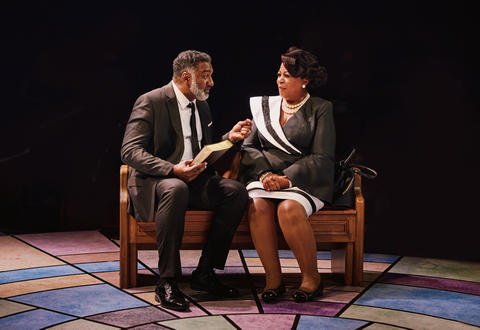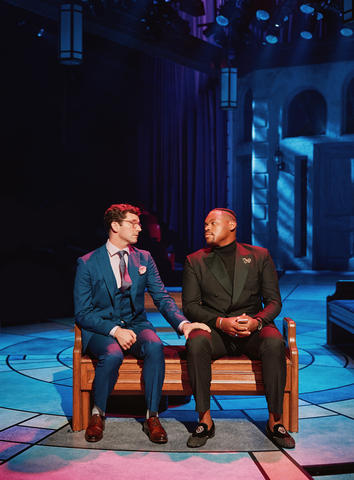Chicken & Biscuits
While the formula may be time-worn and familiar, Douglas Lyons’ new Broadway comedy of a Black family at a funeral is fast-paced and generally bright and appealing.

Norm Lewis and Cleo King in a scene from Douglas Lyons’ new comedy, “Chicken & Biscuits” now at the Circle in the Square Theatre (Photo credit: Emilio Madrid)
[avatar user=”Victor Gluck” size=”96″ align=”left”] Victor Gluck, Editor-in-Chief[/avatar]
Douglas Lyons’ new comedy, Chicken & Biscuits introduces us to the dysfunctional Jenkins/Mabry clan at the funeral of its patriarch Bernard, the former pastor of his New Haven church. Among the various glitches are the arrival of an uninvited family member and the appearance of the gay boyfriend of the son. Sound familiar? The new wrinkle in this Broadway play is that the family is Black. While the formula may be time-worn and familiar, Lyons’ play directed by Zhailon Levingston (also making his Broadway debut as the youngest Black director in Broadway history) is fast-paced and generally bright and appealing. Veteran stars Norm Lewis and Michael Urie lead a fine cast that includes the Broadway debuts of five performers who may be familiar from television, film or Off Broadway.
Set in and around St. Luke’s Church in New Haven, we first meet Pastor Reginald Mabry (Lewis) and his wife Baneatta (King) preparing for the funeral of her father. Replacing Bernard for the first time, Reggie worries about filling his shoes as he is about to give his first sermon as the newly appointed pastor. His overbearing but loving wife is a tenured professor who never lets anyone forget it and has her husband cowed by her demands and requirements. (His solution is to leave the room.) In their hotel room, her younger sister Beverly (Ebony Marshall-Oliver), a single-parent hairdresser from Atlanta, and her typical 16-year-old daughter La’Trice are arguing about Beverly’s totally inappropriate polka dotted outfit with a pushup bra, more suitable for the club than the church in Dede Ayite’s hilarious creation.
Coming up from New York are Reggie and Baneatta’s gay son Kenny and his partner of four years, Logan Leibowitz, both struggling actors. While Kenny proves to be putty in his mother’s hands, Logan is a typical Jewish worry-wart who has not been accepted by Baneatta in the past but was embraced by Bernard. Arriving at the chapel is Simone, Reggie and Baneatta’s older child, who recently went through a painful breakup with her fiancé (that no one else liked) and who left her for a white woman which has given her a complex. Arriving late to the funeral (or celebration as Beverly prefers to call it), is Brianna (NaTasha Yvette Williams), a stranger to all of the family with a secret of her own. When all these volatile people get together explosions are likely to happen.

Michael Urie and Devere Rogers in a scene from Douglas Lyons’ new comedy, “Chicken & Biscuits” now at the Circle in the Square Theatre (Photo credit: Emilio Madrid)
While the material does not seem fresh, the play is continually amusing in the manner of old-fashioned Broadway comedy, a too rare genre these days, and the director keep things bubbling along on Lawrence E. Moten III’s unit set most notable for its colorful modern stained glass windows. Some of the scenes go on a bit long, but the follow-up events always bring up the temperature. While Lewis and Urie are somewhat wasted by being given little to do and not allowed to make use of their special talents, the actresses have all the best lines and make up for these shortcomings.
The hilariously extroverted Marshall-Oliver as Beverly with her blue hair is always over-the-top and turns everything into a confrontation. The more sedate and disapproving King as Baneatta holds her own as the voice of reason and decorum but who eventually thaws when unexpected events present themselves. The priceless Aigner Mizzelle as the teenaged La’Trice is nosy, curious and not above moral and financial blackmail. Alana Raquel Bowers brings a sense of sobriety as the grieving Simone who needs a boost to her ego to get past her being dumped by an unreliable boyfriend.
Lewis who is one of Broadway’s most distinguished baritones is only allowed to sing once and is always fleeing from his wife to somewhere offstage, while Urie’s special brand of off-beat humor is not much in evidence in his low-key performance. However, both men make their presence felt, particularly Urie’s Logan with his verbalized misconceptions about Baptist funerals and Black customs. Rogers in the thankless role of the gay son, cowed by his mother, makes the most of his opportunities. As the seeming interloper, Williams, previously seen in five Broadway plays and musicals including The Gershwins’ Porgy and Bess with Norm Lewis, has a lovely presence as someone who refuses to be upset or dissuaded from her mission.

Aigner Mizzelle, Ebony Marshall-Oliver and Alana Raquel Bowers in a scene from Douglas Lyons’ new comedy, “Chicken & Biscuits” now at the Circle in the Square Theatre (Photo credit: Emilio Madrid)
Levingston makes good use of the Circle in the Square’s three-sided stage even when the funeral begins and the focus is on the pulpit. Most memorable of the design elements are Nikya Mathis’ comical hair and wig design particularly Beverly’s blue hair and La’Trice’s very elaborate do which continue to amuse. The costumes by Ayite (who will have four plays on Broadway this season) are many and varied even though they are all suitably black for the funeral. Beverly’s outrageous club outfit never gets old. Adam Honoré’s lighting design is used to indicate shifts of location on the unit set.
One of seven Broadway plays scheduled this season by Black playwrights many of them making their main stem debuts, Douglas Lyons’ Chicken & Biscuits is an old-fashioned family comedy with a somewhat new milieu. Under the direction of debuting director Zhailon Levingston, the fine cast makes the play seem better than it is and offers many new faces to the Broadway stage. Ultimately, it is a satisfying evening of entertainment. By the way, the title refers to the late Bernard Jenkins’ favorite foods which we are told he could not cook to save his life but loved to eat. The family indulges in this repast in the final scene.
Chicken & Biscuits (through November 28, 2021)
Circle in the Square Theatre, 235 W. 50th Street, west of Broadway, in Manhattan
For tickets, call 212-239-6200 or visit http://www.chickenandbiscuitsbway.com
Running time: two hours and five minutes without an intermission






Leave a comment